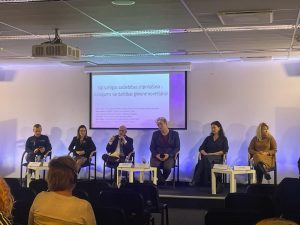
Victim Support Europe Stands Up for Women:
No Woman Left Behind
On this International Day for the Elimination of Violence Against Women, Victim Support Europe stands beside every woman who has suffered from violence. Every woman matters, and none should be overlooked or brushed aside.
Did you know that nearly one in three women, a whopping 736 million globally, has faced physical and/or sexual violence from an intimate partner or otherwise? And that’s not even counting sexual harassment. Shockingly, less than 40% of these women seek any help, and fewer than 10% report it to the police.[1]
It’s time for a change! This is not a social problem we can overlook. We need to empower, support, and protect all women who’ve been victims of violence. But to do this, we must work together.
Services specialising in providing support to victims – whether working with all victims or focusing on specific groups – must come together to commit to the highest possible quality of service. By teaming up and following agreed standards, by helping victims find and choose a service best suited to their needs, we will respect their wishes, and ensure the best outcomes for them.
However, it’s not just professional organisations that are involved. For many women of gender-based violence, such as domestic violence, their entire lives are affected. Their home and family life, work, health, friendships, and childcare and schooling, among others, can all be turned upside down. In the worst cases, victims’ lives can be devastated.
Multiple agencies and sectors all play a role in helping victims escape and recover from violent abuse: through the work of specialist hospital units, co-ordination with schools, social welfare authorities, local administration, the police and justice services, etc. While supporting victims of violence is complex, we should be united in our efforts and must include all agencies with the skills and capacity to help. We simply can’t afford to let victims down!
This approach aligns with a broader context of creating a national framework for comprehensive victim support, which consists of several major themes: building individual resilience, making sure a victim’s social network of family and friends offer positive support, providing professional services countrywide, and guaranteeing that we strive to improve our work, according to a mutually agreed vision, through a national strategy.
The good news is we’re making progress internationally and locally. The EU is close to agreeing groundbreaking new laws on violence against women. New legislation for all victims is also around the corner. More importantly, States and NGOs are coming together to help transform our response to victims of violence.
In the past two weeks, we’ve delved deeper into approaches tackling domestic violence and violence against women in Latvia and Belgium.
Empowering Change: Lessons from Latvia and Belgium in Making Lives Safer

Levent Altan speaking at the conference in Latvia.
On 16 November 2023, Victim Support Europe’s Executive Director, Levent Altan, took part in a crucial event in Latvia. The conference, entitled ‘Inter-institutional cooperation: a comprehensive approach to life in safety’, was held jointly by the Republic of Lativia’s Ministry of Welfare, Ministry of the Interior, State Police and VSE Member Skalbes.
The conference was more than just a meeting. It gave VSE the opportunity to witness first-hand how Latvia is embracing a multi-agency approach to making life safer. Levent shared his insights, emphasising the urgent need for better collaboration among various sectors: “The conference highlighted the pressing need for improved collaboration among civil society, law enforcement, and ministries, among other stakeholders, in addressing the gaps in victim support: a challenge which is highlighted by many VSE members. True cohesive victim support emerges when all stakeholders in victim support, including law enforcement, judiciary, all crime support services, specialised support services, health care, private sector, etc. collaborate.”
While discussions to ratify the Istanbul Convention on Violence Against Women are nearing completion, though some opposition still remains, Latvia finds itself at a pivotal point in addressing violence against women and works towards offering greater protection to all women who fall victim to violent crime.

Family Justice Centre, Limburg
Now, we will turn to Limburg and Flanders, Belgium, where the Flemish Minster of Justice and Enforcement Zuhal Demir has made the issue of violence against women a priority through Family Justice Centres. This pioneering approach to domestic violence brings together different organisation such as police, public prosecutor’s office, social welfare, local municipalities, youth (protective) services, probation services, amongst others, together under one roof. An approach that isn’t simply to avoid paper shuffling bureaucracy; it’s about creating a real impact.
But success isn’t achieved by having agencies sit together. It’s about getting to know each other, knowing each other’s possibilities and limitations. It’s about creating a joint vision and a joint language to strengthen cooperation and tailor-made solutions. This is at a policy level, but especially at a victim’s level, because we know that no two cases are the same.
Everything – whether related to risk, harm, what’s driving the violence, how the violence can be addressed, impacts on the victim and family members – must be explored collaboratively. So, it’s also about screening for risk factors. It’s about sharing information, analysing the situation, looking for patterns, determining the domestic violence profile (compared to families in distress, coercive control, high conflict divorce….) It’s about having a tailor-made approach for each individual situation and never losing sight of the safety of everyone involved, especially the safety of children. Decisions are made according to the victims’ best interests – not by what is easiest or quickest.
While such cross-agency collaboration requires new legislation, infrastructure, and information sharing mechanisms – the financial investment has been worthwhile and society is the beneficiary of this approach. The advantages of this coordinated approach are underscored by its concrete results. Streamlined collaboration has led to approximately 1,250 new families popping up on the radar each year in Limburg. Victim satisfaction surveys indicate that all victims are satisfied to very satisfied with the way the centre operates.

Zuhal Demir, Flemish Minister of Justice and Enforcement
What seemed an impossible task when Limburg first started developing victim-centric solutions 20 years ago, proves today that the impossible is possible – if the will exists. Flemish Minister of Justice and Enforcement Zuhal Demir commented: “The fight against domestic violence needs to be taken more seriously and in Flanders we are clearly moving up a gear. In Limburg we already know how much an FJC can contribute to the fight against domestic violence. Nearly 7,400 families have already been supervised since 2017. It is therefore used as an example for the rest of Flanders. An additional 9 million euros per year and 95 additional staff members will be deployed to make it clear to victims: we are on your side. In doing so, we’re pioneers in Europe. There are FJC’s all around Europe, but the investment in multidisciplinary collaboration has never happened on such a large scale as in Flanders, whereas from the 25th of November onwards, we will have 9 FJC’s in total.”
These Family Justice Centre’s are another step towards a safer, more connected community. Increasingly recognised in Belgium, they can and should transform lives in every country because when everyone works together, change happens.
Together, let’s stand up for every woman, leaving no one behind!
[1] UN Women (2023). Facts and figures. Ending violence against women. https://www.unwomen.org/en/what-we-do/ending-violence-against-women/facts-and-figures

